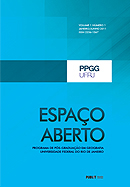Quality of Groundwater Wells in a Traditional Community from Eastern Ceará, Brazil
DOI:
https://doi.org/10.36403/espacoaberto.2013.2105Keywords:
Potability, Water quality, Groundwater, Rural communityAbstract
This study assesses the physical, chemical and microbiological parameters for
the potability of water using standards for rural areas established by Ordinance #518/2004 of the Brazilian Ministry of Health. Samples were collected from ten wells located in Trairussu community, Jacaúna district, Aquiraz municipality, Ceará. The assessment was made using an Alpha Kit for analyzing water potability according to standard methods of water testing. The physical and chemical parameters accessed were: alkalinity, ammonia, chloride, hardness, iron, pH, and microbiological materials (fecal coliform and total coliform). According to the results obtained from the tests performed in the field, it was found that the samples are not in accordance with the Ordinance of the Ministry of Health for the parameters for iron, fecal coliform and total coliform. The findings suggest that the water of the wells analyzed need treatment in order to be made potable for domestic use.


